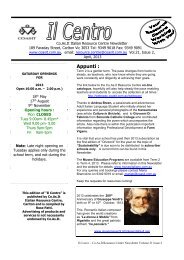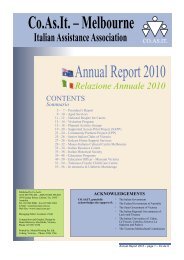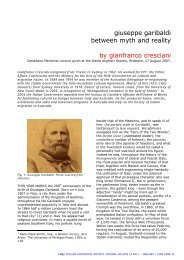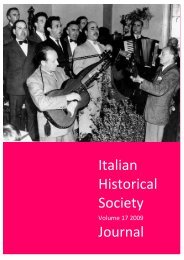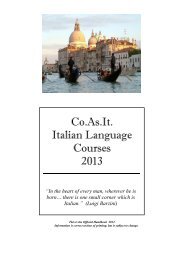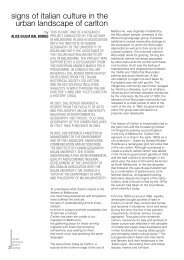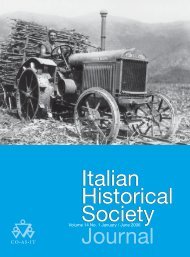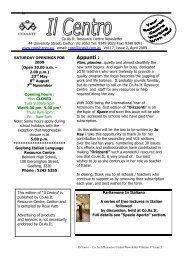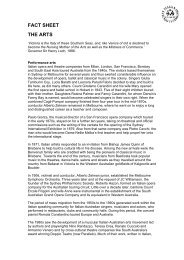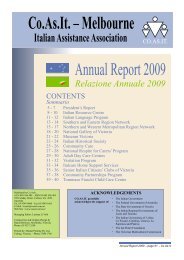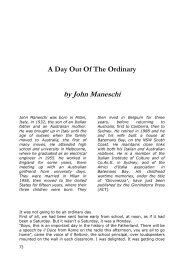January-December 2010, vol. 1
January-December 2010, vol. 1
January-December 2010, vol. 1
- No tags were found...
You also want an ePaper? Increase the reach of your titles
YUMPU automatically turns print PDFs into web optimized ePapers that Google loves.
Arabic with great aplomb. I was fascinated by Gillian becauseshe played the piano very well, perhaps a child prodigy. Sherattled off technically demanding pieces, such as ‘The flight ofthe bumble-bee’ by Rimsky Korsakov, all from memory andwith no noticeable mistakes. She was immediately surroundedby a group of admirers, including the quiet-loving reader whohad objected to my playing. “You see, that’s what I call playingthe piano! Not like your Pastoral Symphony!”Peter, the younger of the two and a scallywag, taught us someArabic words, which he warned us were rude words and not tobe used in polite company.To pass the time, there were several games on deck, includingcards, chess, draughts, Monopoly and table tennis. In no timewe had gathered a group of children, more or less the sameage, and were in no danger of being bored. The table tennistable had been placed along one of the covered decks in a tightspace next to a door that opened on to the second class.Second class passengers were allowed to play as long as thetable was not in use by first class passengers. No such privilegewas extended to tourist class passengers. There were no otherrules to limit play, but we soon became aware of the nastylooks and the sighing of certain passengers who were standingalong the wall waiting for their turn. We quickly learnt goodmanners and put down our racquets at the end of a game.Mother came to watch and, thanks to her democratic instincts,chatted with the second class passengers patiently waiting fortheir turn. That is how we got to know Stefan Simich, aYugoslav, and Igor Malinsky, a Pole. They were both excellentplayers albeit unorthodox in their game style. They enjoyedbelting the ball at each other at surprising speed, performingveritable acrobatics to keep it in play. Mother invited them tocome and have tea with us. “To tell you the truth, the tea israther inferior, but the cakes are delicious.”Both Stefan and Igor were grateful for the invitation and thechance to learn something from Mother about the country inwhich they would soon begin their new lives. Both men wereengineers in their thirties. Conversation was difficult as Simichspoke halted English mixed with many Serbian words. He beganall sentences with, “Oh Bah!” He also suffered from a strangenervous condition whereby he would burst out laughing in themiddle of a sentence, even though he hadn’t said anythingfunny, which made him exceedingly difficult to understand.Andrea, who had a great passion for foreign languages, wasfascinated by his English. “He doesn’t use any articles, no the, a.... Perhaps articles don’t exist in the Serbian language. After all,they don’t exist in Latin ...” Simich became a good friend andhelped us both improve our table tennis technique.Malinsky, on the other hand, spoke excellent Italian without atrace of a foreign accent, but hardly any English, fact of whichhe was ashamed. Mother offered to help him with the Englishlessons that were being given for migrants by the Laurocompany. He had been a cavalry officer in Poland and describedto us the thrill of galloping across the steppes. He was patrioticand sang for us the Polish national anthem in a loud voice withmartial accents. Andrea got him to teach him several Polishwords.They were invited for tea again, but not together. While Motherspoke fluent Italian and English, she found the effort oftranslating Malinsky’s Italian while trying to understand Simich’sEnglish exhausting. To further complicate matters, the twomen, as well as being adversaries at table tennis, were also incompetition for her attention and they interrupted when onethought the other one had spoken enough. Our mother’s newroles – teacher, friend, confidante – left me perplexed. I felt newemotions, almost jealousy. ‘What would papà say?’ I thought.She acutely felt the absence of a good cup of tea, made the wayshe liked it. It was little use talking to the waiters, the mainproblem being the lack of teapots which had not beenconsidered necessary to the refurbishment of M/n Napoli. Shehad a modicum of success with Oscar, the very likeableGenoese barman who had worked in England and was awareof the problem. Oscar succeeded in making an infusion intoglasses with the steam jet of the espresso machine. His onlyclients were Mother and another Australian, Nancy Beltrami.Together they groaned, “How can all those Brits in tourist classmanage without their cup of tea?” Oscar would raise his eyes toheaven and say, “I really don’t know ... I wonder...”Nancy’s husband, Paul Beltrami, was an Italian musician whohad lived in Australia before the war. They were now returningto settle. They had an eight-year old son who became Andrea’sfriend. Mr Beltrami intended to launch the Ducati engine forbicycles that had become popular in Italy after the war into theAustralian market. It was a device that mounted on to theframe of an ordinary bike converting it to a scooter. Very thriftyon petrol but very noisy. It ejected putrid fumes from itsexhaust. Even though it had already been superseded in Italy bythe Vespa and Lambretta, Mr Beltrami had grand hopes for thefuture, “Seven million Australians, all on bikes with my engine.We'll make our fortune!”With her sociable disposition, Mother made many otheracquaintances amongst the passengers. There was the one shecalled ‘the shy Englishman,’ with very polite manners whoalways spoke in a whisper. He must have been short of clothesfor the tropics because he invariably arrived for meals wearingbraces over a singlet, blissfully unaware of the purser’s raisedeyebrows. There was an Italian couple, the Accolti-Gil, whoMother found very congenial. They were going to Sydneywhere they were going to work at the Italian Consulate. Therewas a Hungarian lady who wore lots of makeup, married to anAustralian soldier she had met in Italy during the war and whonow was waiting for her in Melbourne. She was alwayssurrounded by Lauro officers. Mother referred to her as theMerry Widow. She also met two girls from the second class,proxy brides, who were going to Melbourne to meet theirhusbands whom they had never seen.IHSJ ITALIAN HISTORICAL SOCIETY JOURNAL VOLUME 18 <strong>2010</strong> | 29




